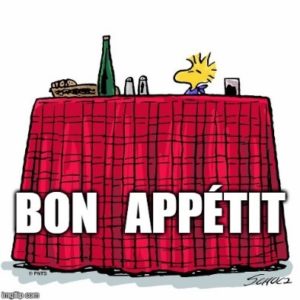Did a waiter serve you food and say ‘Bon appetite’ before walking away? What do they mean? This post unpacks the meaning and origin of this expression.
Meaning
The expression ‘Bon appetite’ is a French saying translating to ‘good appetite’ in English. You’ll use ‘Bon appetite’ when serving people food. The phrase is suitable for use in restaurants and with home-cooked meals. If you say ‘Bon appetite,’ you’re wishing your guests a pleasant meal and enjoyable experience.
If you say ‘Bon appetite,’ you’re hoping your guests have a hearty appetite for your food. It’s another way of saying that you wish your guests a good dining experience.
Typically, people will say ‘Bon appetite’ before serving a meal at a restaurant or before diving into a meal at the dinner table at home. The phrase suits communal meals with family or friends, and you don’t have to have any experience with the French language to use it.
Example Usage
"We have the chicken parm for the lady and the ribeye for the gentleman. Enjoy your food, folks, and Bon Appetite. If you need me for anything, just holler, and I'll come running."
"Here's your dinner, honey. Bon Appetite. You deserve the best food we can afford, cooked to perfection. I hope you enjoy the meal."
"Thanks for joining us on Thanksgiving, everyone. The turkey looks good, and the veggies are amazing. Bon Appetite everyone, and enjoy the meal."
"Folks, here we have the prawn cocktail starter featuring fresh prawns caught off the coastline. Enjoy the meal. Bon Appetite."
"Bon appetite. I spent the entire afternoon preparing this dish, so I hope it tastes good. It's new, so let's see how it goes. Enjoy."
"I went to this French restaurant with my partner last night. After the waiter served us the food, he didn't even bother to say, 'Bon Appetite.' I feel like it wasn't an authentic experience."
"Thanks for coming over for dinner, everyone. It's great to have you all here again. Enjoy the meal. It's fresh wahoo caught off the keys this morning. Bon Appetite."
"I wonder why the people at Burger King never say 'Bon Appetite' when serving your food?"


Origin
The expression ‘Bon Appetite’ originates from the French language. It’s a borrowed expression in English, featuring the same spelling and meaning as the original French. ‘Bon Appetite’ translates to ‘good appetite’ in English, but language experts cannot pinpoint when the saying arrived in the English lexicon or the first use of the term in writing.
English-speaking countries slowly adopted the saying over the decades, and it’s a common phrase spoken around the world. The British were the first to adopt the term, spreading to America in the 1900s.
Phrases Similar to Bon Appetit
- Enjoy the food.
- Tuck in.
- Dig in.
- Eat up.
Phrases Opposite to Bon Appetit
- N/A.
What is the Correct Saying?
- Bon appetite.
Ways People May Say Bon Appetit Incorrectly
You wouldn't say 'bon appetite' to someone as you tuck into a fast food meal. 'Bon appetite' is reserved for standard meals, a la carte restaurants, and similar establishments serving food.
Have you ever heard a Mcdonald’s employee wish anyone 'Bon appetite?' The phrase can apply to all food, not just French cuisine.
Acceptable Ways to Phrase Bon Appetit
You can use the phrase 'bon appetite' when serving a meal to people. You'll use the saying to tell your family or friends that they should enjoy the food. Typically, the person serving the food will use 'bon appetite' to the people sitting at the table.
You could use the term when serving a meal to your partner, or a waiter could say it to you when delivering food to the table at a restaurant. The correct reply to 'bon appetite' is 'thank you.' If you want to take the traditional route and reply in French, you will use the word 'merci.' The phrase can suit any type of food, from home-cooked meals to restaurant dishes.